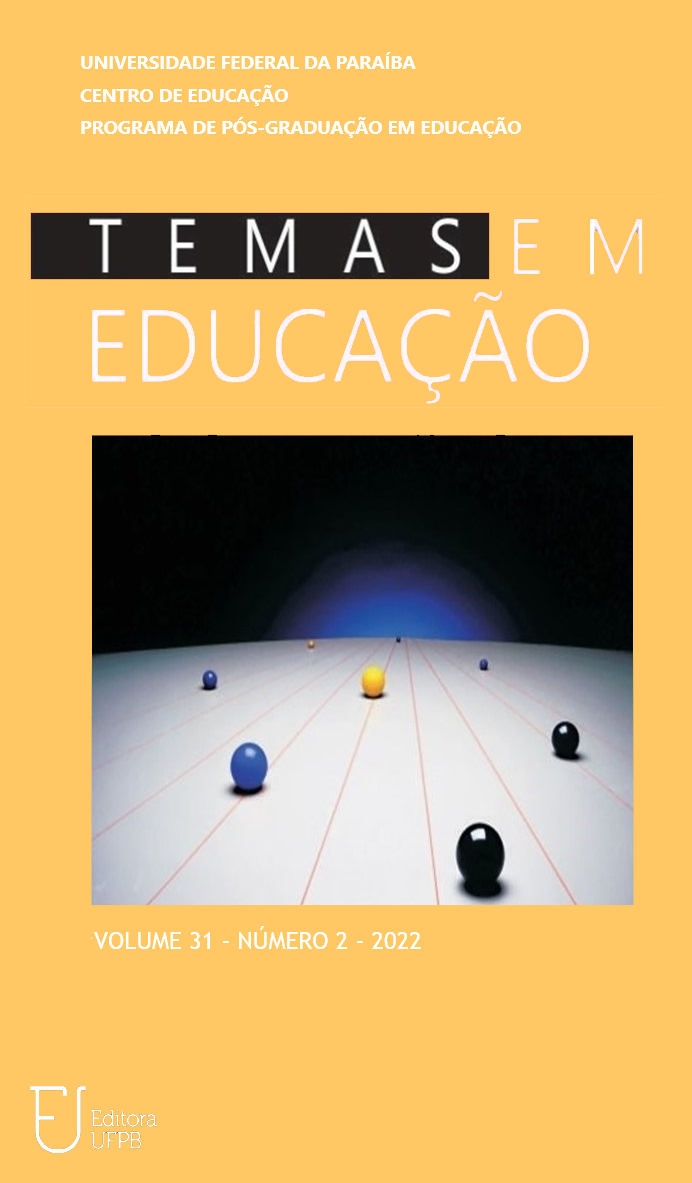THE AUTONOMY OF SCHOOL INSTITUTIONS BEFORE THE PROGRAMS OF COMPLEMENTARY CURRICULUM ACTIVITIES IN CONTRACT IN THE STATE OF PARANÁ
DOI:
https://doi.org/10.22478/ufpb.2359-7003.2022v31n2.61395Keywords:
Public policy. Complementary curricular activities. School management. Autonomy.Abstract
Complementary Curriculum Activities are activities of the schools' free choice, offered after school hours for students enrolled in regular classes that are included as complementary to the mandatory curriculum. This work aims to analyze and understand the autonomy of school managers in the development of programs and projects of complementary curricular activities in the evening within the scope of the Regional Education Center of Ivaiporã, Paraná. As investigative material for the research, documentary analysis and empirical data obtained in semi-structured interviews with managers from the 14 municipalities belonging to the NRE are used. With evidence in the results, it is argued that managers have a pseudoautonomy, evidenced in its different dimensions - financial, political, legal, administrative and pedagogical. It is concluded that, although democratic management speeches are proclaimed in which autonomy is one of the founding principles, the measures imposed by the directives of the programs and pseudoautonomy are a reflection of the intentionality of regulation and control of the State, of a linear and hierarchical character, which restricts the socio-political participation of those involved in the educational process.
Downloads
References
BARDIN, L. Análise de conteúdo. São Paulo: Edições 70, 2011.
BARROSO, J. O reforço da autonomia das escolas e a flexibilização da gestão escolar em Portugal. In: FERREIRA, N. S. C. (org.). Gestão democrática da educação: atuais tendências, novos desafios. São Paulo: Editora Cortez, 2003.
BRASIL. Portaria Normativa Interministerial nº 17, de 24 de Abril de 2007. Institui o Programa Mais Educação. Diário Oficial da União, Brasília, 24 abr. 2007.
CRESWELL, J. W.; CLARK, V. L. P. Designing and conducting mixed methods research. 3. ed. Thousand Oaks, CA: SagePublications, Inc., 2018.
DOURADO, L. F. Programa de Capacitação a Distância para Gestores Escolares – PROGESTÃO. Como promover, articular e envolver a ação das pessoas no processo de gestão escolar? Brasília: CONSED – Conselho Nacional de secretários de Educação. 2001.
GADOTTI, M. A autonomia como estratégia da qualidade de ensino e a nova
organização do trabalho na escola. Petrópolis, RJ: Vozes, 1995.
GIL, A. C. Como elaborar projetos de pesquisa. 4. ed. São Paulo: Atlas, 2008.
LÜCK, H. Perspectiva da Gestão Escolar e Implicações quanto à Formação de seus Gestores. Revista Em Aberto, Brasília, v. 17, n. 72, p. 11-33, fev./jun. 2000.
LÜCK, H. A gestão Participativa na Escola. Petrópolis, RJ: Vozes, 2011.
MENDONÇA, E. F. A regra e o jogo: democracia e patrimonialismo na educação brasileira. 2000. 323 p. Tese (Doutorado) - Universidade Estadual de Campinas, Faculdade de Educação, Campinas, SP.
PARANÁ. Secretaria do Estado da Educação. Superintendência da Educação. Resolução 1.690/2011. Institui a partir de 2008, em caráter permanente, o Programa Atividades Complementares Curriculares em Contraturno na Educação Básica na rede estadual de ensino. Publicado no Diário Oficial nº. 8472 de 24 de Maio de 2011. Curitiba, SEED, 2011a.
PARANÁ. Secretaria do Estado da Educação. Superintendência da Educação. Instrução Normativa n. 004/2011-SEED/SUED. Entende-se por Atividades Complementares Curriculares em contraturno, atividades educativas, integradas ao Currículo Escolar, com ampliação de tempos, espaços e oportunidades de aprendizagem que visam ampliar a formação do aluno. Curitiba, SEED, 2011b.
PARANÁ. Secretaria do Estado da Educação. Superintendência da Educação. Instrução Normativa n. 03/2017-SUED/SEED. Curitiba, SEED, 2017. Disponível em: http://www.educacao.pr.gov.br/arquivos/File/instrucoes2017/instrucao032017 sued_seed.pdf. Acesso em: 15 dez. 2018.
PARANÁ. Secretaria do Estado da Educação. Superintendência da Educação. Instrução Normativa n. 05/2018- SUED/SEED. Curitiba, SEED, 2018. Disponível em: http://www.educacao.pr.gov.br/arquivos/File/instrucoes/2018/instrucao_052 018.pdf. Acesso em: 15 dez. 2018.
PARENTE, C. da M. D. Desvendando a jornada escolar brasileira. Revista Educação e Políticas em Debate, Uberlândia, v. 8, n. 3, p. 319 - 343, set./dez. 2019.
PARO, V. H. Gestão da Escola Pública: a Participação da Comunidade. Revista Brasileira de Estudos Pedagógicos, Brasília, v. 73, n. 174, p. 255-290, maio/ago. 1992.
PARO, V. H. Gestão democrática da escola pública. São Paulo: Ática, 2004.
RUSSO, M. H. Trabalho e administração da escola: desenvolvimento e apropriação do sentido que assumem no processo de produção pedagógica. Revista Brasileira de Política e Administração da Educação, v. 27, n. 3, p. 361-588, set./dez. 2011.
VEIGA, I.P. A. Escola: Espaço do Projeto Político Pedagógico. Campinas, São Paulo: Papirus, 2002.
Downloads
Published
How to Cite
Issue
Section
License
Copyright (c) 2022 Revista Temas em Educação

This work is licensed under a Creative Commons Attribution 4.0 International License.
Authors who publish in this journal agree to the following terms:
. Authors retain the copyright and grant the journal the right to first publication, with the work simultaneously licensed under the Licença Creative Commons Attribution that allows the sharing of the work with acknowledgment of authorship and initial publication in this magazine. . Authors are authorized to assume additional contracts separately, for non-exclusive distribution of the version of the work published in this journal (eg, publishing in institutional repository or as a book chapter), with acknowledgment of authorship and initial publication in this journal.
. Authors are permitted and encouraged to publish and distribute their work online (eg in institutional repositories or on their personal page) at any point before or during the editorial process, as this can generate productive changes, as well as increase impact and citation of the published work (See O Efeito do Acesso Livre).



















